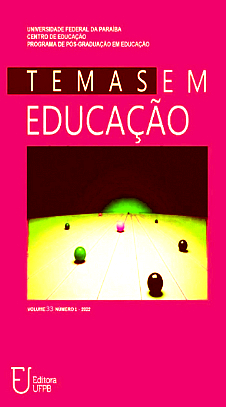CULTURE CIRCLES: CRITIQUES AND SILENCES
DOI:
https://doi.org/10.22478/ufpb.2359-7003.2024v33n1.70685Keywords:
Culture circles, Civil-military coup, silencesAbstract
This article originates from a completed doctoral research that had the intention of addressing the mobilization for the realization of culture circles (which were part of a literacy and popular education movement founded and proposed by Paulo Freire) in Rio Grande do Sul, with temporal delimitation back to the early 1960s. Its sources were mainly newspaper reports and narrative interviews. When returning to these sources, the analysis focused on their mentions of the criticisms produced for that educational practice and the silencing resulting from the Civil-Military Coup that contained, at least publicly, the activities that were taking place. The reports from different moments (all from the late 1950s and early 1960s), as well as the interviews, present some highlights for the theme proposed by the dossier, calling for the writing of perspectives related to the oppression of an educational activity that was being organized with the intention of contributing to processes of liberation and (re)democratization of the Brazilian people. The writing was based on the assumptions of the History of Education and Cultural History for the construction of the theoretical-methodological path of the research, using documentary analysis and Oral History to support the study.
Downloads
References
ANDREOLA, Balduino Antonio. “Cultura e educação popular nos anos sessenta no Rio Grande do Sul”. Educação e Realidade, Porto Alegre, v. 13, n. 2, p. 39-48, jul./dez. 1988. Disponível em: http://www.seer.ufrgs.br/index.php/educacaoerealidade/issue/viewIssue/3063/329. Acesso em: 27 mar. 2024.
BEISIEGEL, Celso de Rui. Política e educação popular: a teoria e a prática de Paulo Freire no Brasil. São Paulo: Ática, 1982.
BURKE, Peter. O que é história cultural? Trad. Sergio Goes de Paula. 2 ed. rev. e ampl. Rio de Janeiro: Zahar, 2008.
CHARTIER, Roger. A história cultural: entre práticas e representações. 2.ed. Rio de Janeiro: DIFEL, 2002.
______. O mundo como representação. Estudos avançados, v.5, n. 11, p. 173-191, abr. 1991. Disponível em: https://doi.org/10.1590/S0103-40141991000100010. Acesso em: 15 mar. 2024.
FERNANDES, Calazans; TERRA, Antonia. 40 horas de esperança: o método Paulo Freire: política e pedagogia na experiência de Angicos. São Paulo: Ática, 1994.
FERREIRA, Marieta de Moraes; AMADO, Janaína. Apresentação. In: FERREIRA, Marieta de Moraes; AMADO, Janaína. Usos & abusos da história oral. 7. ed. Rio de Janeiro: FGV, 2005.
FREIRE, Paulo. Pedagogia do oprimido. Rio de Janeiro: Paz e Terra, 2005.
______; GUIMARÃES, Sérgio. Aprendendo com a própria história. 1 ed. - Rio de Janeiro: Paz e Terra, 2013.
GOMES, Angela Maria de Castro; HANSEN, Patricia Santos. Apresentação: Intelectuais, mediação cultural e projetos políticos: uma introdução para a delimitação do objeto de estudo. In: GOMES, Angela Maria de Castro; HANSEN, Patricia Santos. (org.). Intelectuais mediadores: práticas culturais e ação política. Rio de Janeiro: Civilização Brasileira, 2016.
GINZBURG, Carlo. Sinais: raízes de um paradigma indiciário. In: GINZBURG, Carlo. Mitos, emblemas, sinais: morfologia e história. São Paulo: Cia. das Letras, 1989.
______. O queijo e os vermes: o cotidiano e as idéias de um moleiro perseguido pela Inquisição. São Paulo: Cia. das Letras, 1987.
GRAZZIOTIN, Luciane Sgarbi Santos; ALMEIDA, Dóris Bittencourt. Romagem do tempo e recantos da memória: reflexões metodológicas sobre História Oral. São Leopoldo: Oikos, 2012.
HADDAD, Sérgio. O educador: Um perfil de Paulo Freire. 1.ed. São Paulo: Todavia, 2019.
LE GOFF, Jacques. História e memória. 4.ed. Campinas, SP: UNICAMP, 1996.
NÓVOA, Antonio. Carta a um jovem historiador da educação. Historia y Memoria de la Educación, n. 1, 2015, p. 23-58. Disponível em: http://revistas.uned.es/index.php/HMe/article/viewFile/14111/12822. Acesso em 20 jun. 2024.
PAIVA, Vanilda Pereira. Paulo Freire e o nacionalismo-desenvolvimentista. São Paulo: Graal, 2000.
PESAVENTO, Sandra J. História & história cultural. 3. ed. Belo Horizonte: Autêntica, 2014.
FONTES CONSULTADAS
Fontes Orais
CRAIDY, Carmen Maria. O Instituto de Cultura Popular do Rio Grande do Sul. Porto Alegre, dez. 1989. Entrevista concedida à Balduino Antonio Andreola. In: ANDREOLA, Balduino Antonio. O Instituto de Cultura Popular do Rio Grande do Sul: história, influências e desdobramentos. Relatório de Pesquisa. Universidade Federal do Rio Grande do Sul. Porto Alegre, 1995. [Texto cedido pelo autor].
ENTREVISTADA. Entrevista oral sobre círculos de cultura. Porto Alegre, 06 set. 2018. Entrevista concedida à pesquisadora.
FAGUNDES, Geraldo Meyer. Os movimentos de cultura e educação popular dos anos 60: o Instituto de Cultura Popular do Rio Grande do Sul. Porto Alegre, out. 1989. Entrevista concedida à Balduino Antonio Andreola. In: ANDREOLA, Balduino Antonio. O Instituto de Cultura Popular do Rio Grande do Sul: história, influências e desdobramentos. Relatório de Pesquisa. Universidade Federal do Rio Grande do Sul. Porto Alegre, 1995. [Texto cedido pelo autor].
ZARDIN, Ana Maria. Entrevista oral sobre o Instituto de Cultura Popular do RS. Porto Alegre, mai. 1989. Entrevista concedida à Balduino Antonio Andreola. In: ANDREOLA, Balduino Antonio. O Instituto de Cultura Popular do Rio Grande do Sul: história, influências e desdobramentos. Relatório de Pesquisa. Universidade Federal do Rio Grande do Sul. Porto Alegre, 1995. [Texto cedido pelo autor].
Downloads
Published
How to Cite
Issue
Section
License
Copyright (c) 2024 Revista Temas em Educação

This work is licensed under a Creative Commons Attribution 4.0 International License.
Authors who publish in this journal agree to the following terms:
. Authors retain the copyright and grant the journal the right to first publication, with the work simultaneously licensed under the Licença Creative Commons Attribution that allows the sharing of the work with acknowledgment of authorship and initial publication in this magazine. . Authors are authorized to assume additional contracts separately, for non-exclusive distribution of the version of the work published in this journal (eg, publishing in institutional repository or as a book chapter), with acknowledgment of authorship and initial publication in this journal.
. Authors are permitted and encouraged to publish and distribute their work online (eg in institutional repositories or on their personal page) at any point before or during the editorial process, as this can generate productive changes, as well as increase impact and citation of the published work (See O Efeito do Acesso Livre).



















